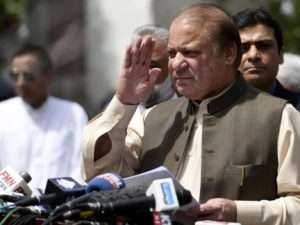 Pakistan’s Prime Minister, Nawaz Sharif, has been forced to resign after he was disqualified from office by the country’s top court.
Pakistan’s Prime Minister, Nawaz Sharif, has been forced to resign after he was disqualified from office by the country’s top court.
The Supreme Court dismissed Mr Sharif after a damning corruption probe into his family wealth.
The investigative panel claimed his family was unable to account for its vast wealth, leading to the court to order a criminal investigation.
Interestingly the use of a Microsoft font has played a huge role in Mr Sharif’s downfall.
The Calibri font was at the heart of the scandal that engulfed Mr Sharif and his daughter, Maryam Sharif, after the 2016 Panama Papers revealed a string of offshore companies linked to the family had been used to purchase a number of luxury properties in London.
Documents submitted in defence of the Sharif family appeared to show that Maryam Sharif was only a trustee of the company that bought the flats.
However, the declaration, dated February 2006, was typed in the Calibri font, which was not introduced until 2007 – raising suspicions that the document may have been forged.
That conclusion was also reached by Pakistani investigators tasked with looking into the case. They dismissed the documents, which were assessed by the Radley Forensic Document Laboratory in London, as “falsified”.
“He is no more eligible to be an honest member of the parliament, and he ceases to be holding the office of prime minister,” Judge Ejaz Afzal Khan said in court.
Mr Sharif, 67, has denied any wrongdoing and has claimed the investigation is biased and inaccurate. His allies have alleged this is just a conspiracy to unseat him.
“This is not accountability, it is revenge,” Railways Minister Khawaja Saad Rafiq tweeted hours before the verdict was announced. “In an effort dislodge us, the democratic system has been made a target.”
The Supreme Court has also reportedly disqualified Finance Minister Ishaq Dar, Mr Sharif’s former accountant, who had submitted documents to the court in the prime minister’s defence.
He has been considered one of the most influential people in Mr Sharif’s cabinet and credited with bringing the economy on to a more sure footing after the 2013 balance of payments crisis.
Mr Sharif’s ruling PML-N party, which has a majority in the parliament, is now expected to appoint a new prime minister.
The controversial Mr Sharif was in his third stint as Prime Minister and his previous two periods in power were also cut short.
His first term as Prime Minister started in 1990 but he was forced to resign three years later while under pressure from the Pakistan Armed Forces.
Corruption allegations against Mr Sharif date back as early as 1993 when investigations began to look into 13 separate allegations of corruption and money laundering.
The criminal charges against members of the Sharif family were dismissed in the Pakistan High Court after Mr Sharif returned to power in 1997.
In 1998, The Independent established bank accounts containing five million pounds were set up in the names of three members of a British family from Ilford, Essex.
These deposits were used to raise millions of pounds in loans which, according to documents detailing Pakistan police inquiries, were channelled into Sharif family-owned businesses.
His second term was also cut short after a military coup against him and he was placed on trial for “kidnapping, attempted murder, hijacking and terrorism and corruption”.
He was convicted and given a life sentence but after Saudi Arabia intervened, Mr Sharif was placed in exile for ten years.
In 2007 the Supreme Court ruled that Mr Sharif should be allowed to return eventually leading to his victory in the 2013 general elections.